For those
who don't know what a Quintet Wall is, or haven't read the full wording on the
cards (wording is important!), I'll kick this article off by
providing the skill:
[AUTO]:[Counter
Blast (1)] When this unit is placed on (GC) from your hand, if you have a «Gold
Paladin» vanguard, you may pay the
cost. If you do, reveal five cards from the top of your deck, call all «Gold
Paladin» from among them to (GC) as [Rest], and put the rest into the drop
zone."
The first
thing you'll notice is that Quintet Walls have the "Sentinel" skill,
which means that for every Quintet Wall you put in your deck, that's one
Perfect Guard you can't put
in, and vice versa, up to a total of 4 cards out of any combination of the two.
Since those dastardly internet Nazis have been spouting "You must run 4 Perfect Guards,
no exceptions!" since just about the beginning of the game, and even
moreso since the new meta rolled in, the "Sentinel" on this card
probably turned tons of people away almost immediately. I have to admit, at first
glance, I was one of those people.
Delving
into the second skill, we see that Quintet Walls call the top 5 cards of your
deck to the guard circle. The inconsistent nature of this type of guarding
turned even more people away, if they managed to get past the
"Sentinel" restriction. Unless you're playing Magus, there's no way
to foretell or control what those top 5 cards are going to be. As with anything
new, there were a spectrum of opinions: Some people said "Wow, you could
get 50,000 Shield with this!" while others said "Wow, you can check 5
Grade 3's with this and completely waste a card in your hand that would
otherwise have been a Perfect Guard." Of course,
the extremities of any spectrum are usually exaggerated and/or wrong,
but those are definitely the first opinions people had of the card.
To
establish exactly what you
can expect from a Quintet Wall, here are percentages:
0 Shield: 0.0029%
5,000 Shield: 0.092%
10,000 Shield: 0.94%
15,000 Shield: 4.55%
20,000 Shield: 12.71%
25,000 Shield: 22.63%
30,000 Shield: 26.54%
35,000 Shied: 20.35%
40,000 Shield: 9.57%
45,000 Shield: 2.39%
50,000 Shield: 0.23%
5,000 Shield: 0.092%
10,000 Shield: 0.94%
15,000 Shield: 4.55%
20,000 Shield: 12.71%
25,000 Shield: 22.63%
30,000 Shield: 26.54%
35,000 Shied: 20.35%
40,000 Shield: 9.57%
45,000 Shield: 2.39%
50,000 Shield: 0.23%
These numbers represent
the odds of revealing X shield amount out of the 5 cards revealed from your
Quintet Wall. They average out to be about 25,000 - 30,000 shield. Please note
that this is an average,
so you will get more
sometimes, and you will also get less. I've been playtesting a Royal Paladin
deck with 4 Quintet Walls (because why not) and I can testify that out of the
15-20 games I've played with it thus far, 20-25 is the average I've been
getting on Cardfight Area (but its Cardfight Area, so...) So, for the
intents and purposes of the rest of this article, I'll be comparing Quintet
Walls to Perfect Guards under the assumption that Quintets will yield you
25,000 Shield.
An important thing to note
is that the Quintet Guard skill says "When this unit is placed on the
Guard Circle from your hand..."
meaning that if you revealed a Quintet Wall in the top 5 of another Quintet
Wall, you cannot activate
its skill to guard with 5 more cards. However, because Perfect Guards say
"When this unit is placed on the Guard Circle" (without the from hand
limitation), you can activate a Perfect Guard revealed by a Quintet Guard.
So, now that we have the mechanics, statistics, and ideas of Quintet Walls down, let's start comparing:
Pro's
1) Quintet Walls are only 1 card out of your hand, rather than 2 that Perfect Guards require.
2) In a lot of decks, the deck itself is an underutilized resource that Quintet Walls grant access to.
3) Similarly, in decks that can spare the counterblast cost, it similarly allows them to utilize resources they otherwise wouldn't.
Con's
1) While the average guard amount is 25,000, it can be any amount, and the unreliable guard amounts may leave you vulnerable to stronger attacks.
2) Decks that must hoard all of their counterblasts, or that plow through their deck at uncomfortable rates (Genesis, Granblue, and Dark Irregulars), may risk being unable to pay the cost or decking out due to the skill.
3) Decks that need certain cards to remain in the deck to utilize skills (Murakumo) run the risk of those cards showing up from the skill, and losing access to them forever.
Perfect Guards
Pro's
1) Guarantee that your unit will not get hit for the duration of the battle.
Con's
1) Requires 2 cards out of hand, rather than 1.
2) The resources it uses to guard all come out of the hand, rather than pooling resources from different locations like Quintets do, leaving decks with less advantage-generation having a harder time supporting the hand size Perfect Guards require.
3) Perfect Guards are dead by themselves. Everyone has experienced that hand where they only have 2 or 3 Perfect Guards in hand, and can only block 1 attack by discard 1 for the cost of another, and having a dead one sit there. Or the dilemma of having interceptors, Perfect Guards, and 10,000 shields, but in the wrong locations (you can't discard an interceptor that's on the field for your Perfect Guard, after all).
Additionally, there are certain situations in which each will surpass the other:
Scenario 1
Your opponent is playing those fiendish Dimension Police and have just performed a Break Ride by riding Great Daiyusha over Daikaiser, keeping in mind that Daikaiser's righteous skill allows him to retire 1 of your guards for each Grade 3 he drive checks. For whatever reason, you know your opponent is running some troll-status 20 Grade 3 deck, and its very likely that he could Drive Check a Grade 3 this turn. Of course, its up to luck either way, and as long as there are 2 non-Grade 3's in his deck, there's a chance he won't trigger his skill (but that's more math for another day). We'll assume you're a cautious player and want to guard under the impression that he will Drive Check a Grade 3. Let's analyze how each Sentinel will perform.
Perfect Guard: 1 Perfect Guard will equal 2 cards out of your hand, and two will equate to 4. If you 2-pass him with shield value rather than a 2nd Perfect Guard, that's going to be even more.
Quintet Wall: 1 Quintet Guard, operating under the assumption of 25,000 Shield I stated earlier, is going to be 1 card out of your hand. Assuming you have an 11,000 Power Vanguard (this is Set 14, what are you doing without an 11,000 Power Vanguard!?), that will bring you up to 36,000 power, a 2-pass to your opponent's 2X,000 Power Great Daiyusha (its a Dimensional Robo deck, they don't generally run Karenroids to pump him up the extra stage). Your opponent drive checking 1 Grade 3 will cause them to retire one of your 10,000 Power shields to break through your shield, but keep in mind that there's always the possibility that you manage to get 30,000 Shield out of the Wall. However, since this article assumes you get 25,000 in all scenarios, this will lead you to add another 5,000 (for a 1-pass) or 10,000 Shield (for 2 Grade 3s), for a total of 2 cards out of your hand. This is 2 cards out of your hand for a guard zone even I would feel safe behind, as opposed to the 2 cards a Perfect Guard would use on its own.
Winner: Quintet Wall
Scenario 2
Let's assume your opponent was salty from the previous match where your impenetrable Quintet Wall blocked his Daikaiser and he demanded a rematch. This time, after Break Riding Great Daiyusha over Daikaiser again, he dumped his whole hand into pumping his Vanguard up. Using Daimagnum and two Dailanders, he's given his Vanguard an additional 12,000 Power, bringing it up to a menacing 35,0000 Power pre-boost, and a 41,000 post-boost. You're still sitting pretty on your lovely 11,000 Power Vanguard. Let's re-visit the scenario.
 Perfect Guard: Yet again, this is 2 cards out of your hand for the gamble that they won't check a Grade 3. Once again assuming he's going to Drive Check another Grade 3, another Perfect Guard will be a total of 4 cards out of your hand. If you want to guard with cards with shield value... god help you. That's going to be 4 or more cards in addition to the 2 from the Perfect Guard.
Perfect Guard: Yet again, this is 2 cards out of your hand for the gamble that they won't check a Grade 3. Once again assuming he's going to Drive Check another Grade 3, another Perfect Guard will be a total of 4 cards out of your hand. If you want to guard with cards with shield value... god help you. That's going to be 4 or more cards in addition to the 2 from the Perfect Guard.
Quintet Wall: Assuming you reveal 25,000 Shield, that's going to bring you to 36,000 Power on defense. Drop a 10,000 shield to bring yourself up to 46,000, a 1-pass or a Grade 3, bringing yourself up to a total of 2 cards used from hand. Another card will be a 2-pass or a Grade 3 and a trigger, with a total of 3 cards. Quintet Wall wins out again, but at such high levels of power, the inconsistencies of the amount of shield you will get from the Wall will definitely come into play. Drawing 20,000 shield rather than 25,000 would force you to guard with the same number of cards as 2 Perfect Guards, whereas if you check 30,000 shield, you'll guard with only 2 cards out of your hand.
Winner: I'll call this one a tie.
Scenario 3
Taking the shield-killing Daikaiser out of the equation, let's look at a situation in which the opponent is just swinging for what should be illegal amounts of power. You're playing against Bobby Anime, who wants to be just like Ren. In his attempts to do so, he is playing a Set 4 Shadow Paladin Deck and has just fed 6 units and 4 counterblasts to his idol, Phantom Blaster Dragon. The conduit of his likely-erotic love for Ren is attacking you for 37,000 Power and will deal you 3 damage upon hit, sacrificing you to the great Ren-sama and deepening your opponent's level of fanboy. Let's see how best to purge him of his weeaboo ways:
Perfect Guard: If you haven't caught on by now, this is going to be 2 cards out of your hand, and multiple tears from your opponent's eyes when he realizes he just wasted the equivalent of 8 cards in resources.
Quintet Wall: Once again, we're going to the 25,000 Shield average. This will bring your 11,000 Power Vanguard up to 36,000 guarding power, which requires 10,000 more shield to make it a 2-pass. That's going to be 2 cards out of your hand, or 3 if you don't have any 10,000 shields, and a counterblast. Since he likely won't have any Rear Guards to pass triggers on to, he'll be throwing all of his triggers onto his Vanguard regardless, meaning you can use 2 cards out of your hand to 2-pass and hopefully not get sacked, or use 2 cards to guarantee your safety and then smite him the following turn.
Winner: Perfect Guard
Scenario 4
In the past scenarios I've explored powerful Vanguard attacks and how much bang for your buck you'll get out of each type of Sentinel. However, in this last scenario, I'm going to showcase a different attack: The Rear Guard. The are a good number of ways to hit large numbers in the Rear Guard circle, be it Palamedes boosted by Marron/Toypugal, some 12,000 attacker boosted by a 9,000 booster that quite a few clans have access to, any of the Boss Unit/Especial Booster columns, Silent Tom boosted by Gemini, or even just a normal Rear Guard column buffed up by an unfortunate double trigger by the opponent. The point being, a Rear Guard that swings for a 3-stage guard (a 15,000 guard, or 3 increments of 5,000) can be a huge hassle, especially if its something that can happen consistently. It might only be something you have to deal with for 2-3 turns before the game ends, but that's all it takes for the opponent to gain an advantage over you. If your Rear Guards are only forcing 1 card each (a 10,000 Shield) each, whereas he has one that is forcing another card each turn, you're going t: o fall behind in advantage. Let's look and see which Sentinel is going to excel in helping you out of this situation.
Perfect Guard: A Rear Guard swinging 21,000+ is going to force at least 2 cards in regular shield, equal to the number of cards you'd use if you were to use a Perfect Guard.
Quintet Wall: Yet again, assuming your Quintet Wall is going to net you 25,000 Shield, you'll be sitting pretty at a 36,000 defending Vanguard. Even with 2 triggers, their Rear Guard will only hit 31,000, which you'd be blocking with only 1 card out of your hand. Even if they hit 0 triggers, that's still 1 card out of your hand you would be guarding with, half of what it would normally use.
Winner: Quintet Wall
As you can see, Quintet Walls and Perfect Guards both have special niche's they both fill. If your opponent's Vanguard is going to hit numbers that are absurd, even by the current game's power standard, a Perfect Guard is going to be your best bet. If the opponent's Vanguard is attacking for 26,000 or less, Quintet Wall is going to be superior, on average. If they hit for 31,000, both Sentinels are, on average, will perform similarly. Perfect Guards won't outclass Quintet Walls until the opponent can exceed forcing 25,000 guard.
On the other hand, Quintet Walls will beat Perfect Guards out nearly every time when facing a deck where the Vanguard doesn't, on average, swing for large numbers, or one where Rear Guards swing for just as much, if not more, than the Vanguard. They provide just as much protection, for half the cost.
It is also worth mentioning that certain deck's just flat-out can't support Quintet Walls. Those deck's would be:
Dark Irregulars: With the amount of soul charging that goes on in a Dark Irregular Deck, it just simply can't afford to lose anymore cards from the deck. Some variants have deck out issues as they are now, nevermind a unit that removes 5 extra cards from the deck.
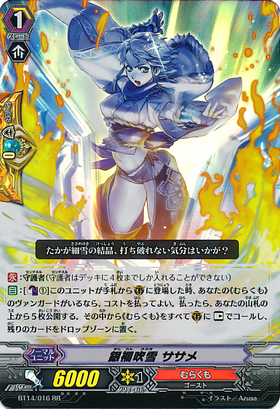
Genesis: The same as Dark Irregulars. They both hoard soul, which leads to a smaller deck, thus the inability to thin cards even more willy-nilly. The only exception would be the Regalia deck, which doesn't need much soul to work, and has Apple Witch, Cider, who can turn the cards the Quintet Wall uses to guard into soul.
Granblue: While loading up the drop zone and simultaneously guarding big attacks is a good thing for the deck, given that Cocytus "Reverse" is the only decent boss unit they currently have, they just can't risk the deckout scenario, just like the above clans.
Tachikaze: This would really be a tech choice rather than something they outright can't support, but Tachikaze is a very counterblast-heavy deck, and in my experiences with the deck, the counterblast that would go towards the Quintet (multiple of them, if you plan on using a Quintet multiple times), are much better served going towards recycling their units and using skills.
Shadow Paladins: Similarly to Tachikaze, they simply don't have the spare counterblasts to waste on multiple Quintets.
So, whereas Perfect Guards are more useful the higher the numbers the opponent's Vanguard is going to swing, Quintet Walls are far more useful for blocking regular Limit Break-power levels and high-powered Rear Guards, making them an all-around more efficient way to guard. However, in exchange for their efficiency, Quintet Walls have the uncertainty of their exact guard amount, as well as the tax of 1 counterblast.
Final Verdict: Both! Quintet walls, with their introduction, have created a much more efficient way to guard, something a lot of players have been demanding ever since power creep became evident in the game, and units began swinging for higher numbers. Despite being more expensive, however, Perfect Guards are capable of protecting you from higher numbers, but by running 4 Perfect Guards, you're taxing your hand fairly heavily over the course of the game, which some decks can't support. On the other hand, other decks can't afford to pay 4 counterblasts that running 4 Quintet Guards would require of you if you were devote your entire deck to them. So, just like Hannah Montana, you should aim for the best of both worlds. A ratio of 1:3, 2:2, or even 3:1 of Quintet:Perfect Guard would all be things to delve into, to see which combination would work best with your deck, would counter your lock meta the best, or you just personally like better. Running both Sentinels allows you to safely block huge swings, while also preventing yourself from wasting too many cards in the mid game, or on powerful Rear Guards.
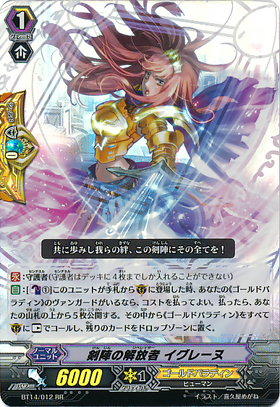
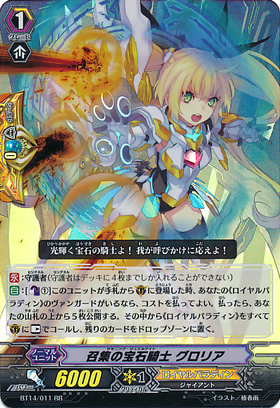
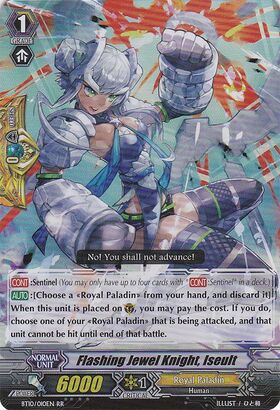
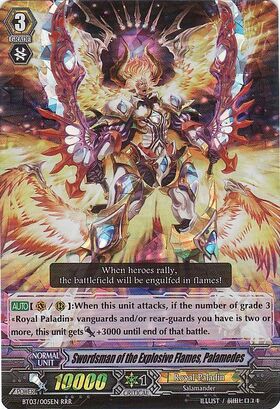
No comments:
Post a Comment